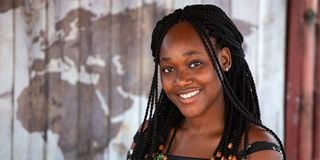What N’Guessan’s win means for Africa’s women in STEM

Charlette N'Guessan, a Cote D'Ivorian technology entrepreneur in Accra is the first ever woman to win the Royal Academy of Engineering's prestigious 2020 Africa Prize for Engineering Innovation.
What you need to know:
- The prestigious 2020 Royal Academy of Engineering Africa Prize for Engineering Innovation has gone to Ms Charlette N’Guessan’s.
- Globally, only 16 per cent of female students graduate from STEM courses compared to 47 per cent for male.
- The 26-year-old won the £25,000 (Sh3.5 million) prized award for having innovated a BACE API together with her co-founders.
- A 2020 study by The African Academy of Sciences on Factors which Contribute to or Inhibit Women in STEM in Africa found male students’ support to be influential in success of female students in these courses.
The prestigious 2020 Royal Academy of Engineering Africa Prize for Engineering Innovation has gone to Ms Charlette N’Guessan’s. This achievement brings into perspective significance of supporting women to take up science-related courses.
Globally, only 16 per cent of female students graduate from Science, Technology, Engineering and Mathematics (STEM) courses compared to 47 per cent for male, a 2016 Gender Gap Report by World Economic Forum (WEF) shows.
On average in 2015, women accounted for 30 per cent of researchers in the STEM disciplines in the sub-Saharan Africa, provides data from United Nations Educational, Scientific and Cultural Organization (Unesco).
There are, however, country variations on female representation. In Lesotho, for instance, the female researchers’ proportion dropped from 76 per cent to 31 per cent between 2002 and 2011.
Female students
While between 2011 and 2013, the representation increased in South Africa to 43.7 per cent, followed by Egypt at 42.8 per cent and Morocco with 30.2 per cent.
A 2020 study by The African Academy of Sciences on Factors which Contribute to or Inhibit Women in Science, Technology, Engineering, and Mathematics in Africa found male students’ support to be influential in success of female students in STEM courses.
“Peer support from student of the same or different gender— support from male students seemed to be key in ensuring that female students completed their STEM courses,” reads the report.
To succeed, the women in STEM studies also need affirmative initiatives such as payment of fees alongside material support or encouragement from family members in STEM-related fields, the researchers state.
55 member States
In Africa, countries are encouraged to allocate one per cent of their gross domestic product (GDP) for research and development to enhance STEM innovations. This is an enticement provided for under the African Union’s Consolidated Plan of Action (CPA) on matters of science, technology and innovation (STI) to which the 55 member States ascribe to.
The 26-year-old Ms N’Guessan, a co-founder of Ghana-based software company, BACE Group, won the £25,000 (Sh3.5 million) prized award for having innovated a BACE API together with her co-founders.
The Royal Academy of Engineering prides in her being the first ever woman to win the Africa Prize. Ms N’Guessan and her team won the prize in a virtual award ceremony on September 3, where the Africa Prize judges and a live audience voted in their favour.
Artificial intelligence
The technology entrepreneur is a Cote D’Ivorian but lives in Accra, Ghana. With her co-founders, she developed the software that enables Ghana’s banks financial institutions to use facial recognition and artificial intelligence to verify identities remotely thus, curb identity fraud and cybercrime.
Discovery of Ghana’s banks spending roughly $400 million annually in identifying their customers prompted Ms N’Guessan and her team to develop the anti-cybercrime software in 2018.
BACE API uses live images or short videos taken on phone cameras to detect whether the image is of a real person or a photo of an existing image.
Tracy Kimathi
Ms N’Guessan was shortlisted from 15 candidates including four Kenyans namely Jack Oyugi who has come up with Aquaprotein, an affordable protein supplement for animal feed made from invasive water hyacinth.
Also Richard Arwa who has developed CIST Ethanol Fuel, a clean cooking ethanol made from invasive water hyacinth.
Others are Samuel Rigu of Safi Organics, a novel chemical process that turns crop waste into a range of affordable fertilisers.
And Tracy Kimathi of Tree, Sea.mals Mini-Grid, a solar system that powers communal refrigeration storage spaces in rural Kenya.
Ms N'Guessan told CNN that her interest in technology started at a young age while growing up in Ivory Coast.
Software engineering
Her father, a mathematics professor, encouraged her to focus on science and technology subjects.
“He inspired my choice for studying STEM. I was actually really good in science-related courses. After high school, I went on to study software engineering at university,” she said.
She said she hopes the win will motivate more women to consider careers in tech.
“I will be happy if people are inspired by my story, being the first woman to win the Africa Africa Prize for Engineering Innovation and by my work as a woman in tech,” she told CNN.
Three finalists
Aisha Raheem from Nigeria, Dr William Wasswa and David Tusubira both from Uganda were the three finalists who received £10,000 (Sh1.4 million) each.
Raheem has developed Farmz2U, a digital platform that provides farmers with tailored agricultural data to improve their experience and efficiency.
Dr Wasswa has created PapsAI, a low-cost digital microscope that speeds up cervical cancer screening diagnosis and systems to improve patient record management. While Tusubira is the developer of Remot, a system that manages off-grid power grids by monitoring the condition of solar arrays.




